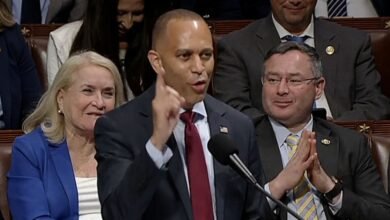

Lest we forget, the insurrectionary Capitol Riot that occurred three years ago was at the time almost universally condemned by Republicans as well as Democrats. Quite naturally, the GOP members of Congress who had to hide from the violent yahoos invading their workplace were in no mood to defend them. Their leader in the House, Kevin McCarthy, got on the horn to Donald Trump to upbraid him for not stopping the riot, reportedly exclaiming, “They’re trying to f- – – – – – kill me!” Several senators were sufficiently upset by the outside help they were getting in trying to deny Joe Biden the presidency that they abandoned their challenges to the Biden electors. Trump and his allies initially denied any connection between the riot and his “Stop the Steal” rally and/or denied that the rioters were actually his supporters (some claimed instead they were mostly antifa agents provocateurs).
Yes, all but seven Republican members of the Senate subsequently voted to acquit Trump of impeachment charges associated with his involvement in the insurrection. But most, particularly their leader, Mitch McConnell, made it very clear the acquittal was based on a technicality: Trump’s departure from office, which Republicans claimed made impeachment impossible since there was no office from which to remove him. Indeed, McConnell followed up the Senate trial with a scorching speech holding the former president “practically and morally responsible for provoking the events of that day.” Nikki Haley, a weather vane of the Republican Establishment, said a week later, “We need to acknowledge he let us down … He went down a path he shouldn’t have, and we shouldn’t have followed him, and we shouldn’t have listened to him. And we can’t let that ever happen again.”
In the intervening three years, the GOP has quite obviously rethought its negative judgment of Trump’s conduct just before and on January 6. That’s true of the many Republican Establishment pols who have endorsed his 2024 candidacy, the even greater numbers who have pledged to support him if he’s the nominee (including opponents Haley and Ron DeSantis), and the party’s rank and file. A recent Washington Post–University of Maryland poll showed the percentage of Republicans who believe Trump should bear “a great deal” or “a good amount” of responsibility for the riot has dropped nearly in half (to 14 percent) since the first anniversary of January 6.
What’s more remarkable (and sinister) is that Republicans are rethinking their condemnation of the insurrection itself, even of its most violent manifestations at the Capitol. A Monmouth survey in September 2023 showed 61 percent of Republicans denying that Biden had fairly won the 2020 election. An earlier Monmouth poll showed 61 percent of Republicans describing the riot as a “legitimate protest.” This very week, USA Today–Suffolk likely captured the settled opinion of Republicans with 62 percent agreeing those who stormed the Capitol “went too far, but they had a point” (just 16 percent described them as “criminals”) and 60 percent agreeing that “the legal actions against the January 6 participants are inappropriate and should be reversed.”
The lionization of the rioters after January 6 was initially limited to a handful of MAGA extremists, mostly in the fever swamps of social media, where Ashli Babbitt, the rioter who was shot and killed by the Capitol Police as she tried to reach the House chamber, became recognized as a martyr to the cause. But as early as July 2021, Trump himself began referring to Babbitt as a victim of injustice. By the time the first anniversary of the insurrection arrived, grassroots Republican groups were beginning to call the rioters, particularly those being prosecuted, “J6Patriots”:
Trump’s personal role in the justification of the riot can hardly be exaggerated. Soon after that first January 6 anniversary, Trump — who was not even a candidate at that point — went out of his way to promise a pardon for imprisoned rioters if he became president again. But after he did become a candidate, he took a major leap in the ex post facto legitimization of the riot. The Washington Post explained the backstory:
Most nights at 9 p.m., defendants in the Jan. 6, 2021, attack on the U.S. Capitol flicker the lights in their D.C. jail cells to signal to supporters outside that it’s time to sing “The Star-Spangled Banner” together. The recital has become a sacred ritual for a subset of Donald Trump’s movement devoted to heroizing the accused rioters.
Soon, Trump had co-opted the “patriotic protest,” as the Associated Press reported:
The song is simple and tinny, but that hasn’t stopped it from being embraced by former President Donald Trump and his allies in their campaign to rewrite the history of the deadly Capitol riot.
The tune, “Justice for All,” is the Star-Spangled Banner, and it was sung by a group of defendants jailed over their alleged roles in the January 2021 insurrection. Recorded over a prison phone line, the national anthem sounds more like a dirge than celebration and is overlaid with Trump reciting the Pledge of Allegiance.
Despite its low fidelity, “Justice for All” has garnered a lot of fans … The $1.29 song last month briefly vaulted to No. 1 on iTunes, supplanting such recording artists as Miley Cyrus and Taylor Swift.
And then Trump incorporated it into his entrance at his first official 2024 campaign rally in March 2023 in Waco, Texas:
He ended this remarkable tribute by commenting, “Our people love these people.” This identification of insurrectionists with patriotism has now displaced the traditional Trump-rally entrance anthem, Lee Greenwood’s “God Bless the USA.” And Trump has begun routinely referring to imprisoned rioters as “hostages.”
Why is Trump doing this, and why are Republicans following him in the growing acceptance — if not glorification — of near-treasonous (perhaps actually treasonous) violence?
It’s part and parcel of the former president’s overall 2024 campaign strategy, which is deeply invested in describing the attempts to hold anyone accountable for January 6 as a second effort to deny him a fair shot at the presidency. To a remarkable extent, Trump has succeeded in convincing rank-and-file Republicans (and, more grudgingly, all but his most obdurate intraparty opponents) that his indictment for trying to overturn the 2020 election (the most prominent and likely the first to go to trial among his many indictments) is a frantic “dirty trick” by the Biden administration to bar him from making an electoral comeback. That’s why Trump’s legal problems have actually increased his domination of the current Republican field, rather than giving voters second thoughts about supporting him, while delegitimizing every legal proceeding against him in the eyes of GOP voters.
As they warm to the idea of a 2024 Trump vindication-and-vengeance tour, Republicans are naturally, if slowly, beginning to think of the insurrection itself as kinda cool, rather than a hot mess of dangerous extremism. By the time the general election rolls around, the initially shocking MAGA displays of love for people who assaulted police officers, threatened to hang Mike Pence, and vowed to thwart the constitutional handover of power may become commonplace. As more of them complete their sentences, you can certainly expect some former “J6 hostages” to make appearances at the Republican National Convention in Milwaukee this summer. Perhaps they’ll sing the “Star-Spangled Banner” there as delegates salute and then cheer. It won’t bode well for what the country may face in January 2025 whether Trump wins or loses.




